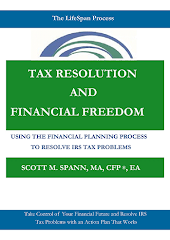
As people with tax or other financial problems embark on their tax and financial planning missions they need to embrace the idea of change. Dealing with tax problems can be a significant challenge. Tax resolution planning requires you to take a different approach to managing taxes and personal finances. The tax resolution process may be difficult and frustrating at times and you should always prepare for and expect minor setbacks. If you take the steps one at a time and prepare to take control of your life as it relates to money you will be able to obtain meaningful change.
Taking Action: Elements of Change
1. Readiness to change
2. Barriers to change
3. Expect setbacks
The concept of tax resolution planning involves taking action. If you want to change your financial life and get out of tax debt you have to take action. You have to want to change and be ready to accept it with courage and a positive attitude. Improving your financial well being requires a constant pursuit of meaningful change in all aspects of your life.
Many barriers to change exist along life’s journey no matter what the challenge. In the tax and financial planning world these barriers could be procrastination and fear. Other obstacles such as lack of support or marital discord may also stand in the way of change. Whatever your personal barriers are you need to go ahead and accept the fact that there will be obstacles. You should expect to incur setbacks and prepare for them. This does not mean that you should accept failure. You simply need to prepare for the minor setbacks and never allow them to stop you on the journey to financial freedom.
Assessing the Change Process
Behavior change is an ongoing process and in theory progresses through a series of stages. These theoretical stages were introduced by James Prochaska, Ph.D. and are generally referred to as the Transtheoretical Model of Change (Stages of Change Theory). I know that is a big word. Do not focus on it as much as the importance of assessing where you are in the change process while seeking ways to resolve tax problems. As you progress through the Tax Resolution Steps (and then focus on the Steps to Financial Freedom) always keep in mind as to which stage you are in.
1. Pre-contemplation- person does not intend to take action in the next six months
Example: IRS letters are completely ignored, unwilling to discuss the need to file past due tax returns, continue to spend more than you earn, no personal spending plan, may not even realize a tax problem exists
2. Contemplation- person intends to take action in the next six months
Example: Realizes the need to deal with tax issue, understands the need for a tax and financial plan, lack of awareness where to turn to for help and guidance, do not understand the financial mess they are in, tried to create a budget in the past but failed, defensive (pulled into action before they were ready)
3. Preparation- person intends to take action in the next 30 days
Example: Researching available tax resolution options, deciding whether or not to seek professional help, beginning stages of organization, gathering tax and financial documents
4. Action- person has taken action, but for less than six months, hardest most demanding step, make a commitment to place the tax resolution and financial planning process as the top priority for the next six months,
Example: Seeking help with tax resolution issues, creating a personal spending plan, determining the best particular tax resolution alternative, working the steps of tax resolution and financial freedom
5. Maintenance- person has take action for more than six months, stress is the top reason people regress at this stage, there is a need to create positive choices or alternatives to deal with stress (social support/talking, exercise, relaxation, following a financial "life plan")
Example: Staying current with IRS payments, filing future tax returns on time, reviewing personal spending plan on an ongoing basis, communicating regularly with spouse about money
6. Termination- person will not revert to self-defeating, self-destructive financial behaviors; learning new behaviors and making them a part of who you are, similar to the challenge that people are faced with addiction
Example: Tax freedom is achieved by paying off the tax liabilities. Future tax and financial problems are avoided by consistently using positive financial behaviors. Developed the ability to take control of money and focus on other parts of life.
The LifeSpan Process of Tax Resolution and Financial Freedom promotes the termination of problematic financial behaviors. The best way to do this is to learn better alternatives such as planning, eliminating debt, avoiding debt, saving and investing. This process of change eliminates debt faster and reduces the likelihood of future tax or financial struggles.





No comments:
Post a Comment